
The Nez Percé are an Indigenous people of the Plateau who are presumed to have lived on the Columbia River Plateau in the Pacific Northwest region for at least 11,500 years.

Toppenish is a city in Yakima County, Washington. As of the 2020 census, the city population was 8,854. It is located within the Yakama Indian Reservation, established in 1855.

The Yakama are a Native American tribe with nearly 10,851 members, based primarily in eastern Washington state.
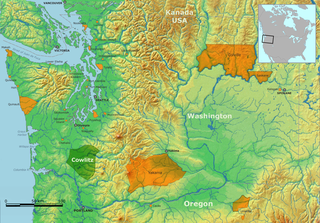
The term Cowlitz people covers two culturally and linguistically distinct indigenous peoples of the Pacific Northwest; the Lower Cowlitz or Cowlitz proper, and the Upper Cowlitz / Cowlitz Klickitat or Taitnapam. Lower Cowlitz refers to a southwestern Coast Salish people, which today are enrolled in the federally recognized tribes: Cowlitz Indian Tribe, Quinault Indian Nation, and Confederated Tribes of the Chehalis Reservation. The Upper Cowlitz or Taitnapam, is a Northwest Sahaptin speaking people, part of the Confederated Tribes and Bands of the Yakama Nation.
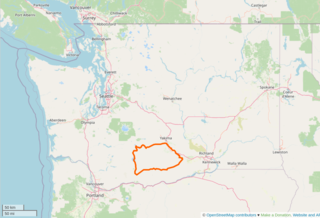
The Yakama Indian Reservation is a Native American reservation in Washington state of the federally recognized tribe known as the Confederated Tribes and Bands of the Yakama Nation. The tribe is made up of Klikitat, Palus, Wallawalla, Wanapam, Wenatchi, Wishram, and Yakama peoples.

United States v. Washington, 384 F. Supp. 312, aff'd, 520 F.2d 676, commonly known as the Boldt Decision, was a legal case in 1974 heard in the U.S. District Court for the Western District of Washington and the U.S. Court of Appeals for the Ninth Circuit. The case re-affirmed the rights of American Indian tribes in the state of Washington to co-manage and continue to harvest salmon and other fish under the terms of various treaties with the U.S. government. The tribes ceded their land to the United States but reserved the right to fish as they always had. This included their traditional locations off the designated reservations.

The Yakima War (1855–1858), also referred to as the Yakima Native American War of 1855 or the Plateau War, was a conflict between the United States and the Yakama, a Sahaptian-speaking people of the Northwest Plateau, then part of Washington Territory, and the tribal allies of each. It primarily took place in the southern interior of present-day Washington. Isolated battles in western Washington and the northern Inland Empire were sometimes separately referred to as the Puget Sound War and the Palouse War, respectively.
Colestah, was one of the five wives of Chief Kamiakin (1800–1877) of the Yakama Native American tribe. She is described as being a medicine woman (twati), a psychic, and a "warrior woman".
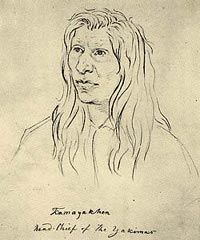
Kamiakin (1800–1877) (Yakama) was a leader of the Yakama, Palouse, and Klickitat peoples east of the Cascade Mountains in what is now southeastern Washington state. In 1855, he was disturbed by threats of the Territorial Governor, Isaac Stevens, against the tribes of the Columbia Plateau. After being forced to sign a treaty of land cessions, Kamiakin organized alliances with 14 other tribes and leaders, and led the Yakima War of 1855–1858.
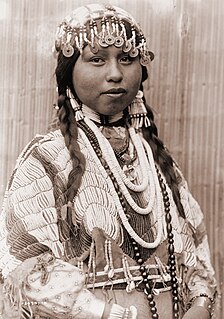
Wasco-Wishram are two closely related Chinook Indian tribes from the Columbia River in Oregon. Today the tribes are part of the Confederated Tribes of Warm Springs living in the Warm Springs Indian Reservation in Oregon and Confederated Tribes and Bands of the Yakama Nation living in the Yakama Indian Reservation in Washington.
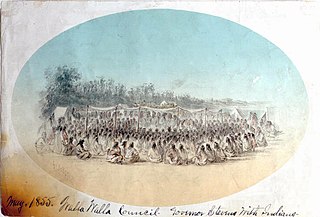
The Walla Walla Council (1855) was a meeting in the Pacific Northwest between the United States and sovereign tribal nations of the Cayuse, Nez Perce, Umatilla, Walla Walla, and Yakama. The council occurred on May 29 – June 11; the treaties signed at this council on June 9 were ratified by the U.S. Senate four years later in 1859.
The Wenatchi people or Šnp̍əšqʷáw̉šəxʷi / Np̓əšqʷáw̓səxʷ are Native Americans who originally lived near the confluence of the Columbia and Wenatchee Rivers in Central Washington state. They spoke Interior Salish and ate salmon, starchy roots like camas and biscuitroot, berries, deer, sheep and whatever else they could hunt or catch. The river that they lived on, the Wenatchee River, had one of the greatest runs of salmon in the world prior to numerous hydroelectric dams being put in on the downstream Columbia, pollution and other issues, and was their main food source.
United States v. Winans, 198 U.S. 371 (1905), was a U.S. Supreme Court case that held that the Treaty with the Yakima of 1855, negotiated and signed at the Walla Walla Council of 1855, as well as treaties similar to it, protected the Indians' rights to fishing, hunting and other privileges.
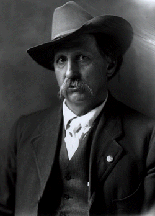
Lucullus Virgil McWhorter was an American farmer and frontiersman who documented the historical Native American tribes in West Virginia and the modern-day Plateau Native Americans in Washington state. After living in West Virginia and Ohio, in 1903 he moved to the frontier of Yakima, Washington, in the eastern part of the state. He became a rancher and activist, learning much from his Yakama Nation neighbors and becoming an activist for them. In 1914 he was adopted as an honorary member of the Yakama, after helping over several years to defeat a federal bill that would have required them to give up much of their land in order to get any irrigation rights. They named him Hemene Ka-Wan,, meaning Old Wolf.
Glenwood is an unincorporated community and census-designated place (CDP) in Klickitat County, Washington, United States. It is 26.5 miles (42.6 km) west-northwest of Goldendale and has a post office with ZIP code 98619. The community is on land whose jurisdiction is disputed between the Yakama Nation and Klickitat County.
Lavina Washines was the first female leader of the Yakama Nation, Washington, United States.
The Yakama Nation Tribal School is a public tribal high school located in Yakima County, Washington, adjacent to Toppenish, run by the Yakima Nation. It is affiliated with the Bureau of Indian Education (BIE).
Tulee v. Washington, 315 U.S. 681 (1942), was a United States Supreme Court case in which the Court held the Washington statute prescribing license fees for fishing is invalid as applied to a Yakima Indian convicted on a charge of catching salmon with a net without first having obtained a license, in view of the Treaty with Yakima Indians securing to them the exclusive right of taking fish in all streams running through or bordering reservation and right of taking fish at all usual and accustomed places in common with citizens of Washington.

Andrew Jackson Bolon was a Bureau of Indian Affairs agent whose 1855 death at the hands of renegade Yakama is considered one of several contributing factors in the outbreak of the Yakima War. Some sources assert Bolon was the first law enforcement officer killed in the line of duty in the territory that is now the state of Washington, though the Washington Peace Officers Memorial in Olympia, Washington lists a King County sheriff's deputy killed the year before Bolon's death.
Washington State Dep't of Licensing v. Cougar Den, Inc., 586 U.S. ___ (2019), was a United States Supreme Court case in which the Court held that the Yakama Nation Treaty of 1855 preempts the state law which the State purported to be able to tax fuel purchased by a tribal corporation for sale to tribal members. This was a 5-4 plurality decision, with Justice Breyer's opinion being joined by Justices Sotomayor and Kagan. Justice Gorsuch, joined by Justice Ginsburg, penned a concurring opinion. There were dissenting opinions by Chief Justice Roberts and Justice Kavanaugh.











